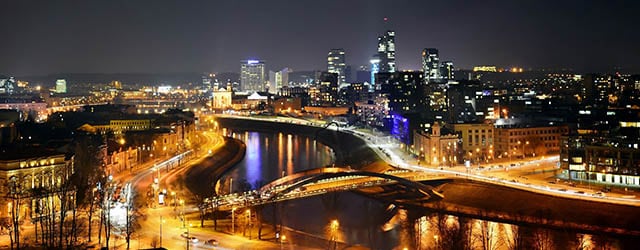Dogged by high unemployment, Lithuania is losing young people at an alarming rate.

Lithuania’s entry into the eurozone on January 1 was marked by considerable pomp and circumstance, as the large crowds gathered in the old town of Vilnius were treated to a well-choreographed withdrawal of the nation’s first euro by prime minister Algirdas Butkeviius and a bluster of fireworks. But after the smoke cleared, observers pointed out that the adoption of the euro may do little to dent the high unemployment rate in the country. Indeed, the lack of jobs in the Baltic state in recent years has given rise to an even bigger concern. Lithuania is getting smaller.
When Lithuania broke away from the former Soviet Union in 1990, the country’s population was 3.7 million. Now, it’s close to 2.9 million. Lithuania has lost one in five countrymen in a mere twenty-five years.
Younger Lithuanians constitute a large proportion of that total. Some have relocated because they’ve been unable to land a job that pays decently. Others can’t get any work at all: the unemployment rate in Lithuania in 2014 was around 11%. “It’s a huge problem,” says Theo Thomas, the lead economist for Eastern Europe and the Baltic Countries at the World Bank.
The good news is that the jobless rate has been declining since topping out at 18% in 2008—and could dip below 9% this year. And as Thomas points out, real wages were up about 5% last year. The payoff? The number of Lithuanians departing the country has been slowing of late, from 83,000 in 2010 to around 40,000 in 2013.
Officials in Vilnius are also betting that an influx of foreign companies setting up shop in the country will keep more Lithuanians at home. Last year a record 29 overseas corporations—many drawn by the low-wage workforce—announced plans to establish businesses or expand existing operations in Lithuania. Capital investments by overseas companies doubled.
US corporations are leading the charge. Thermo Fisher Scientific, a life sciences company, announced plans in 2014 to expand its molecular biology center in Vilnius. Tobacco giant Philip Morris intends to enlarge a production facility in Klaipda. Norwegian businesses are also big players in Lithuania.
To attract more foreign companies, Lithuania will have to up its game—or at least its output. “The challenge, long-term, is getting productivity up, not just [being] a low-cost producer,” Thomas notes.
The bigger economic picture, however, looks promising. End-of-year estimates pegged GDP per capita in 2014 at around $16,476—which would set Lithuania on a par with Hungary and Poland. GDP growth should come close to 3.5% this year, some economists say. Plus, the European Commission expects Lithuania’s current-account balance to head back into the black this year due to a pickup in exports.
But Vilnius is facing problems on a different front. Concerns about Russian aggression spiked in February after that country conducted military exercises near the Baltic states. In response to the threat, Lithuanian president Dalia Grybauskait declared that the country will reinstate military conscription later this year. Fireworks did not accompany the announcement.
VITAL STATISTICS |
|---|
|
Location: Baltics |
|
Neighbors: Latvia, Belarus, Poland, Russia |
|
Capital city: Vilnius |
|
Population: 2.94 million |
|
Official language: Lithuanian |
|
GDP per capita (2014 estimate): $16,476 and trending up |
|
GDP growth (2014): 2.9% and trending up |
|
Inflation (2014): 1.2% |
|
Currency: Euro |
|
Investment promotion agency: Invest Lithuania |
|
Investment incentives available? Yes, including reduced taxes for foreign investors and establishment of tax-free economic zones. |
|
Ease of Doing Business rank: 21 out of 189 countries |
|
Corruption Perceptions Index rank: (2014) 39 out of 175 countries |
|
Political risk: Low, but the government has changed hands in every general election since 1990. This has created lack of continuity in some policies and economic reforms. |
|
Security risk: Potential for Russian expansion beyond Ukraine; dependence on foreign sources of energy. |
PROS |
|---|
|
Low inflation rate |
|
Eurozone member |
|
Skilled, low-cost workforce |
|
Stable banking system |
|
Strong investor protection laws |
CONS |
|---|
|
High unemployment rate |
|
Dependence on domestic consumption |
|
Industrial output dominated by one refinery |
|
High external debt burden |
Sources: Bank of Lithuania, Santander, Central Intelligence Agency, Coface, Euler Hermes, www.Gov.UK, International Monetary Fund, Michigan State University, Transparency International, Trending Economics/Eurostat, US Department of State, World Bank.
For more information on Lithuania, check out our Country Economic Reports.



